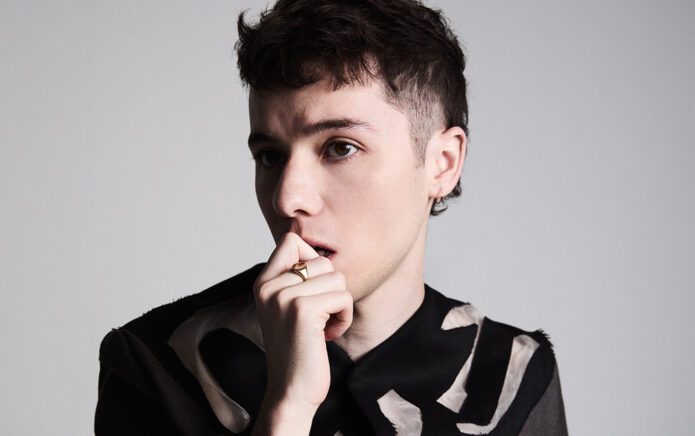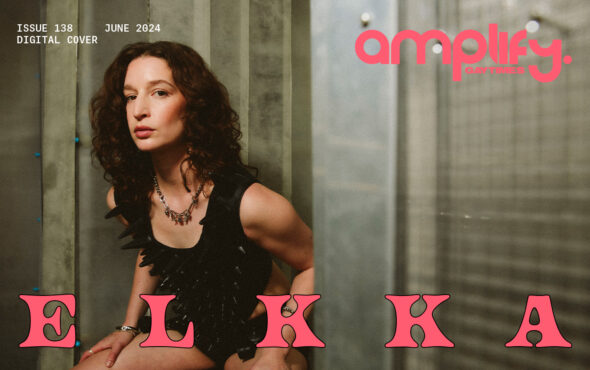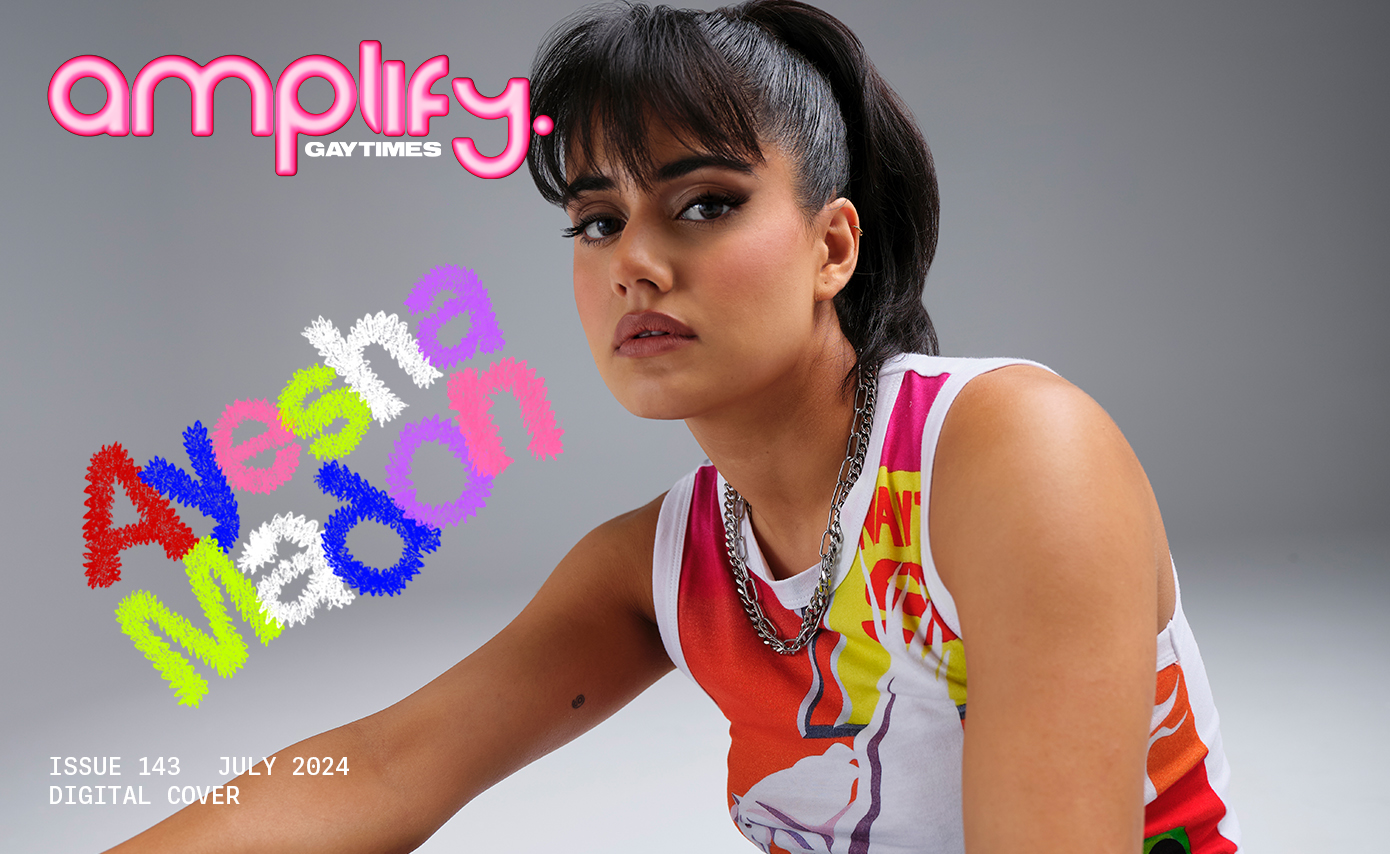
Right now, it’s Ayesha Madon’s moment. Poised, face illuminated by a beaming ring light, the 26-year-old Australian actress is grinning over Zoom. And, of course, she’s excited. In recent years, a lot has been at play for Madon – she’s garnered high praise for her lead role in Netflix’s campy teen series Heartbreak High and picked up nominations including the AACTA Audience Choice Award for Best Actress and the Logie Award for Most Popular New Talent. As season two of the hit show drops, Madon has been taking things easy, tending to areas of her life that matter most: her mental health and family.
So, what does “just trying to survive” look like to an artist aware of the fame on the horizon? Well, it involves binge-watching Bridgerton, “keeping busy” and making time for music. More than anything, Madon wants to maintain being focused. Her debut single ‘Eulogy’, a deceivingly spritely pop track, ruminates on how we’d all like to be remembered by those closest to us. Whether she’s cutting in The Office quips in her music or singing about the inconvenience of crushes, Madon’s sound feels refreshing and entirely her own. While the artist only has two singles to her name, the 26-year-old has a seemingly clear idea of her direction – and that includes embracing pop music. “I started as a pop girlie and then, somewhere along the line, I felt this shame around being a pop writer,” she says. “This single, ‘Blame Me’ feels like straight-down-the-middle pop and I never thought I would let myself release something like that.”
Taking a brave step in a new direction is what drives Madon. It’s here, she’s making her Olivia Rodrigo pivot, delicately balancing acting and music as she increasingly becomes known for both. But, outside of her career, she’s growing too – willingly opening up about her queerness for the first time and contemplating who her favourite LGBTQIA+ artists are. We catch up with the multi-hyphenate star to hear more about her grand plans as a new artist.
‘Euology’ was your big single and it peels back the layers of what insecurity can feel like and what we think of other people’s perspective of us. What inspired that song?
After Heartbreak High came out, I felt like this constant expectation to be perfect and that everyone endowed me with this. I was like ‘fuck, I wish I realised how much of a mess I am’ and I wish I knew that nothing was perfect, even the people I watch in TV shows. I was exacerbated by the pursuit of perfection and how imperfection actually becomes quite taboo to talk about. In ‘Eulogy’, I laid it all out there because I felt like I was not living up to the image that was being put onto me, it didn’t feel true.
Within TV shows your role is scripted, you’re assigned a wardrobe and you’re expected to embody a character – everything is curated for you. With music, that autonomy switches to you. What was it like to navigate that difference?
It’s a nice dichotomy to have autonomy in one [position], and then for the other to be interpretive. Bearing your soul and being vulnerable through your art is how I approach music. I know a lot of musicians prefer character-driven writing, but my music is always personal to me and tied to my life. Sometimes, that can bear too much weight so it can be fun not always to have things about me and to live in a character where I have to interpret a writer’s work. With [Heartbreak High], I don’t even have to promote it. It’ll just come out and that’s that.
Music has more autonomy. It’s nice to be able to tell my own story and who I am as an artist and take charge of that. Expression is super necessary as well. So I’d say they work symbiotically in keeping me engaged creatively.
How has being a musician and actor challenged you?
I’ve learned when to put the pen down. When you have autonomy over something, you can hyper-fixate on it for too long, and you can be too pedantic with it to the point where perfectionism is just disabling you from actually making stuff and having momentum as an artist.
With acting, you’ve only got as many takes as the director is willing to give you, and it teaches you collaboration because you don’t get to choose the edit — you have to let the work be and you have to trust the collaborators around you. Remembering that art is not about you, and just immersing yourself in the process, has so much magic. So, I think I’ve learned to let go of perfectionism.
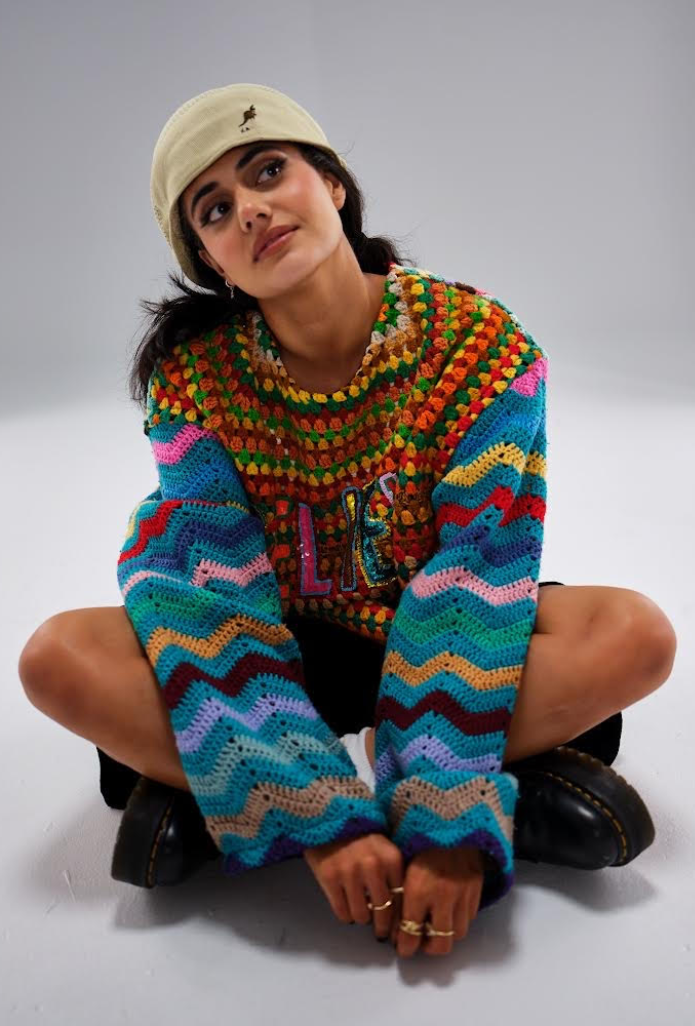
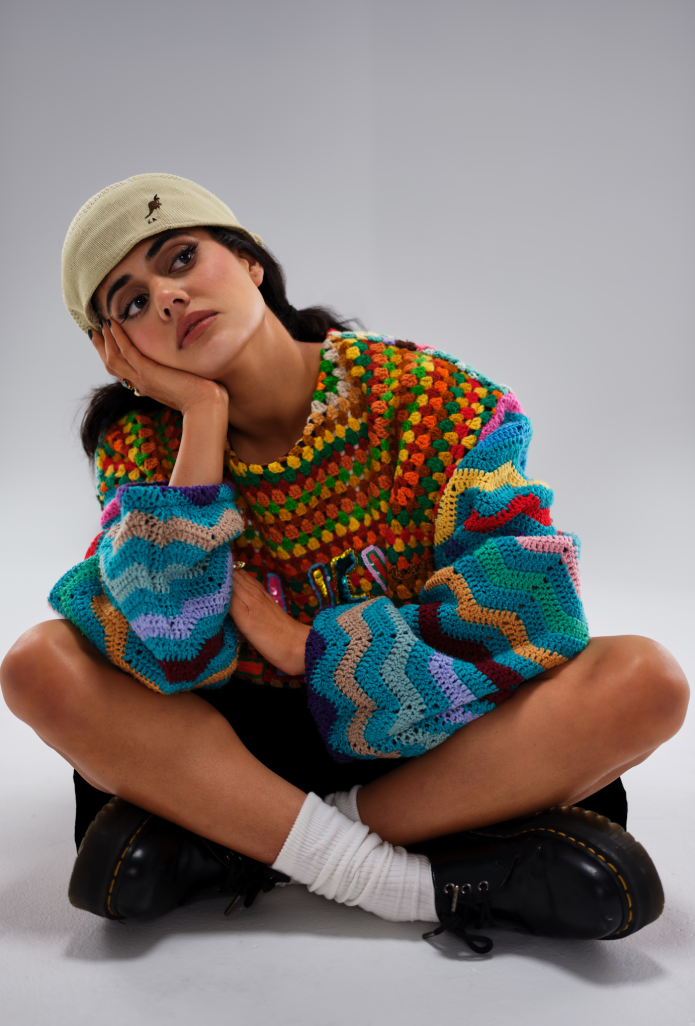
Were you able to surrender to that feeling and process with the new single, ‘Blame Me’?
My process is usually to write by myself. I’m pretty attached to having autonomy and control as an artist. I wrote ‘Eulogy’ by myself, I co-produced it and produced the first demo of it. With ‘Blame Me’, I wrote it in a session. I never write music in a session because it always feels a little bit of a watered-down version of me. When I wrote ‘Blame Me’, truth be told, I didn’t like the song and I needed convincing to put it out. As time went on, I was in the studio again with Japanese Wallpaper, Gabriel Strum, who produced the song and it found its legs.
Releasing ‘Blame Me’ has been an important step in trusting collaborators and not overthinking what I’m putting out. I withheld a lot of music for so long and it landed me in this place where I felt paralysed to not release music, so this single has been really important for me.
Our identities shape how we present ourselves and experience the day to day. For you, how has queerness or the LGBTQIA+ community shaped your life?
I only properly admitted, out loud, that I was bisexual two or three years ago. It feels recent. It’s pretty interesting watching myself be attracted to [girls]. My first kiss was with a girl. I’ve actually never spoken about my sexuality before in anything, so this is pretty new.
My first kiss was with a girl called Louise and I had the biggest crush on her. She was in my acting class when I was 11. I remember she was chewing gum and in order to kiss her I had to pretend that I wanted to try the gum! We kissed and it was amazing. Since then [with] how much more normalised it’s becoming, it has given me the courage to feel comfortable. Sometimes I feel like I’m a fake queer person because I’m not massive on queer culture. Sometimes, I feel that liking girls is not enough.
We all discover our queerness differently – and there’s no right way of feeling “enough”. Some people use the lesbian master doc, while others just figure it out as they go…
What’s the master doc?
It’s an online doc that prompts you to question your sexuality and reassess the influence of compulsory heterosexuality. It’s widely shared online and breaks down talking points on why you might be attracted to women – even Kehlani has read it!
When I was growing up, I felt myself being conditioned or gaslighted into thinking that I was straight. I look back now at all these signs that I’ve had crushes on girls my whole life but in my head, I was like ‘oh that’s just nothing!’
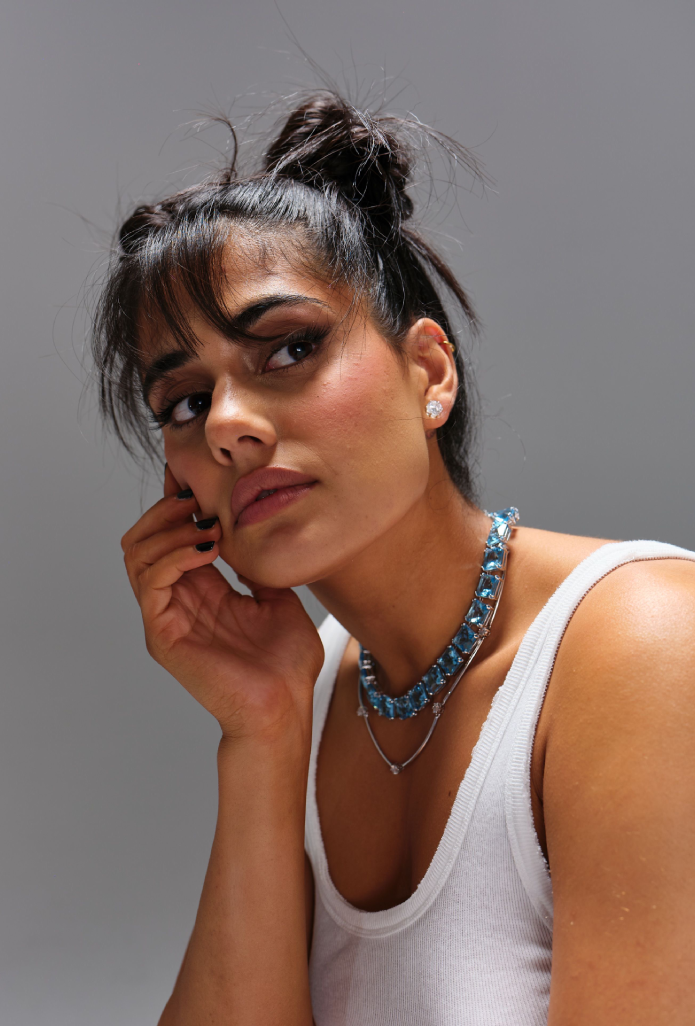
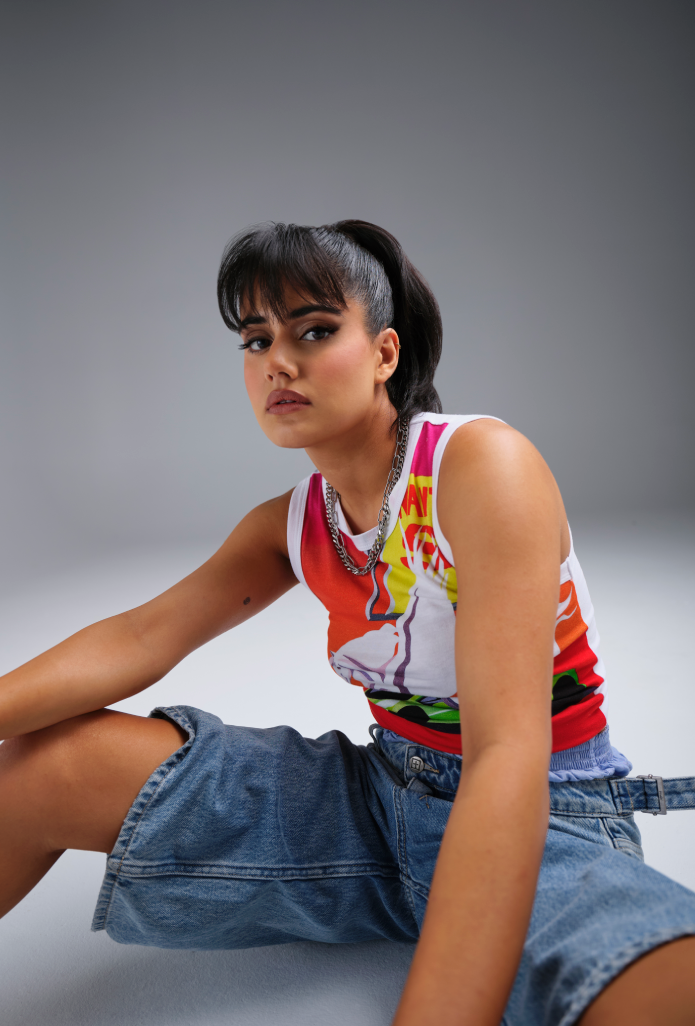
In the spirit of Pride, we have to ask: who are your favourite LGBTQIA+ artists right now?
Chappell Roan! Reneé Rapp and… Is Rina Sawayama queer?
Yes, she’s pansexual! What was it about her music that appealed to you?
Rina Sawayama fully changed how I approached my artistry, 100%. She curates things so well. Every song feels song in a different fucking genre but she can handle it all and it somehow sounds unified. There’s something about her work that feels profound and that was always the type of music that I wanted to make. I wanted to make political music, I wanted to make ironic and funny music – I never saw anyone do it until Rina Sawayama. She kind of changed the game for me.
We’ve just had Pride Month (happy Pride!). What message you would share, as part of the community, to LGBTQIA+ readers?
I’ve got one and I need to take my own advice. It’s one that applies to me and I think it applies to a lot of people, especially in a day and age where people are exploring their sexuality. It’s this: my pride message is, there is no right or wrong way to be a queer person. That is my pride message.
You’ve got a handful of exciting singles out, including ‘Blame Me’ which explores the inconveniences of crushes. Can you tell us about your bigger plans for your EP?
I’m in the process of putting together an EP. Mental health is important to me, and it’s something that I’ve really struggled with in the last few years. The UK is probably way more progressive than Australia. But, in Australia, it’s still not talked about enough. My EP will be mainly centred around my mental health – and I’m excited to get out a body of work. It’s not going to be a perfect body of work, and I hope it’s not because I just need to put out stuff that I like. I’m learning to trust my instincts on that. So, this EP is going to be very instinctual to me and that is my goal.
Ayesha Madon’s new single ‘Blame Me’ is out now.
This interview has been edited for clarity.
